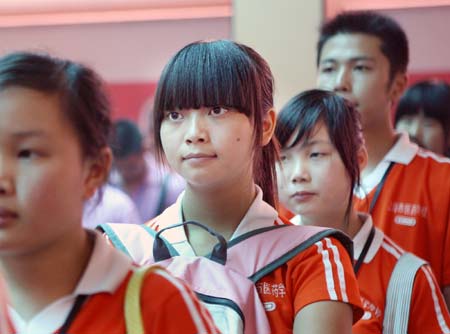LOCAL teachers have given a zero grade to a draft rule which proposes schools stop giving pupils written homework in order to lower study stress.
This is one of 10 rules drafted by the Ministry of Education, aiming to reduce the burden on pupils. Among targets are excessive homework and extra academic classes outside of school hours.
The trend toward extra classes has emerged where schools and parents are pushing children to get into top middle schools.
However, teachers say homework is essential if children are to develop academic skills
“It is unreasonable for children to have no written homework in literacy teaching,” said primary school Chinese teacher Lu Pei.
While young children learn fast, they also forget fast, said Lu. Homework is a good way to help them remember and consolidate what they have learned in class, added the teacher. Lu’s view is echoed by many teachers and educationists.
“Reducing homework isn’t the same as having no written homework,” said Pan Zongjuan, principal of Changning Experimental Elementary School.
“What teachers should avoid is assigning repetitive homework if children can learn the lesson points through fewer assignments.” Pan said that even if the schools didn’t give homework, anxious parents would organize out-of-school lessons, fearing their children would lag behind.
Parents of one Shanghai second-grader said they have this year spent nearly 30,000 yuan (US$4,901) on extra classes such as English and mathematics.
An education official said it would be better if the change came through parent attitudes.
“Compared with making rules, it is easier and more effective to relieve children on stress through parents changing their views,” said Qu Jiajie, an official with the basic education department under the Shanghai Education Commission.
Other rules in the draft include no exams for students under the third grade and that senior students should take no more than two exams per subject every semester.
The draft also says primary and middle schools shouldn’t select students based on exams, certificates or awards.
The ministry is soliciting public opinion through emails and online portal. It is not known when the rules will take effect.
This is one of 10 rules drafted by the Ministry of Education, aiming to reduce the burden on pupils. Among targets are excessive homework and extra academic classes outside of school hours.
The trend toward extra classes has emerged where schools and parents are pushing children to get into top middle schools.
However, teachers say homework is essential if children are to develop academic skills
“It is unreasonable for children to have no written homework in literacy teaching,” said primary school Chinese teacher Lu Pei.
While young children learn fast, they also forget fast, said Lu. Homework is a good way to help them remember and consolidate what they have learned in class, added the teacher. Lu’s view is echoed by many teachers and educationists.
“Reducing homework isn’t the same as having no written homework,” said Pan Zongjuan, principal of Changning Experimental Elementary School.
“What teachers should avoid is assigning repetitive homework if children can learn the lesson points through fewer assignments.” Pan said that even if the schools didn’t give homework, anxious parents would organize out-of-school lessons, fearing their children would lag behind.
Parents of one Shanghai second-grader said they have this year spent nearly 30,000 yuan (US$4,901) on extra classes such as English and mathematics.
An education official said it would be better if the change came through parent attitudes.
“Compared with making rules, it is easier and more effective to relieve children on stress through parents changing their views,” said Qu Jiajie, an official with the basic education department under the Shanghai Education Commission.
Other rules in the draft include no exams for students under the third grade and that senior students should take no more than two exams per subject every semester.
The draft also says primary and middle schools shouldn’t select students based on exams, certificates or awards.
The ministry is soliciting public opinion through emails and online portal. It is not known when the rules will take effect.





0 comments:
Post a Comment